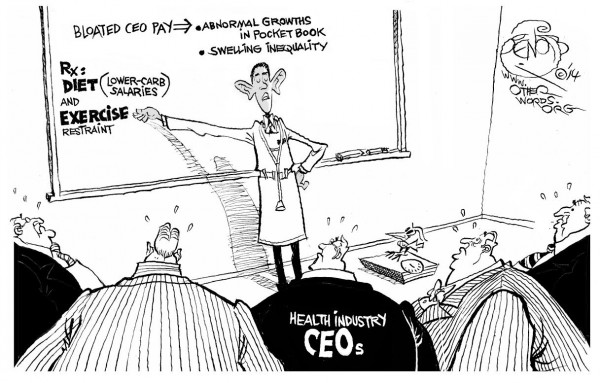Support justice-driven, accurate and transparent news — make a quick donation to Truthout today!
You’ve surely heard many things about the Affordable Care Act, including the website headaches that embarrassed the Obama administration during the new program’s rollout.
But you probably didn’t realize that when you pay your premium today, you can rest assured that it’s paying for health care and not a CEO’s new yacht. You can thank the way ACA treats CEOs — and other executives — in the health care industry for that.
When lawmakers debated this landmark legislation, some members of Congress worried that it might produce a bonanza for health insurers by delivering millions of new customers to them practically overnight. Who would hold those companies accountable as all this new cash rolled into their coffers?
A major concern was that health insurance executives might fatten their own paychecks instead of investing in health care. One way these companies benefit from high executive pay is to deduct the cost of so-called “performance pay” from their federal income taxes. Corporations use that loophole to avoid billions of dollars in taxes every year.
Why not close this performance pay loophole as a requirement for health insurance companies under the Affordable Care Act?
 Dr. Spoilsport’s CEO Treatment, an OtherWords cartoon by Khalil Bendib
Dr. Spoilsport’s CEO Treatment, an OtherWords cartoon by Khalil Bendib
That’s exactly what Congress did.
A new Institute for Policy Studies report I co-authored takes the first look at the impact of closing this loophole for health insurers. We found that for the 10 largest health insurance companies, the share of executive pay that could be deducted as a business expense fell dramatically from nearly 100 percent to only 27 percent after the Obama administration rolled out the ACA.
For 2013, that translated into $72 million in additional tax dollars.
In the future, this amount will likely be much higher. Why? Because most health insurer executive stock options exercised last year pre-dated the ACA and were therefore exempt from the new rules. From now on, such exemptions won’t be an issue.
Of course, once corporate boards realize how much excessive pay is adding to their corporate tax burden, they may decide to stop doling out extravagant compensation packages altogether — freeing up money to be invested in care. But even if high pay continues, at least health insurers will have to pay taxes on it — like the $72 million they had to pay for 2013.
And what could that $72 million pay for?
Dental care for 262,000 people for an entire year. Or the annual deductible for 28,000 Americans for an entire year.
In addition to closing the pay loophole, the Affordable Care Act also requires health insurers to spend at least 80 percent of customer premiums on health care.
More than 10 million Americans have already gained coverage because of the new law. That it’s also holding the profit-making side of the health care industry accountable is a great bonus for all of us.
Press freedom is under attack
As Trump cracks down on political speech, independent media is increasingly necessary.
Truthout produces reporting you won’t see in the mainstream: journalism from the frontlines of global conflict, interviews with grassroots movement leaders, high-quality legal analysis and more.
Our work is possible thanks to reader support. Help Truthout catalyze change and social justice — make a tax-deductible monthly or one-time donation today.
